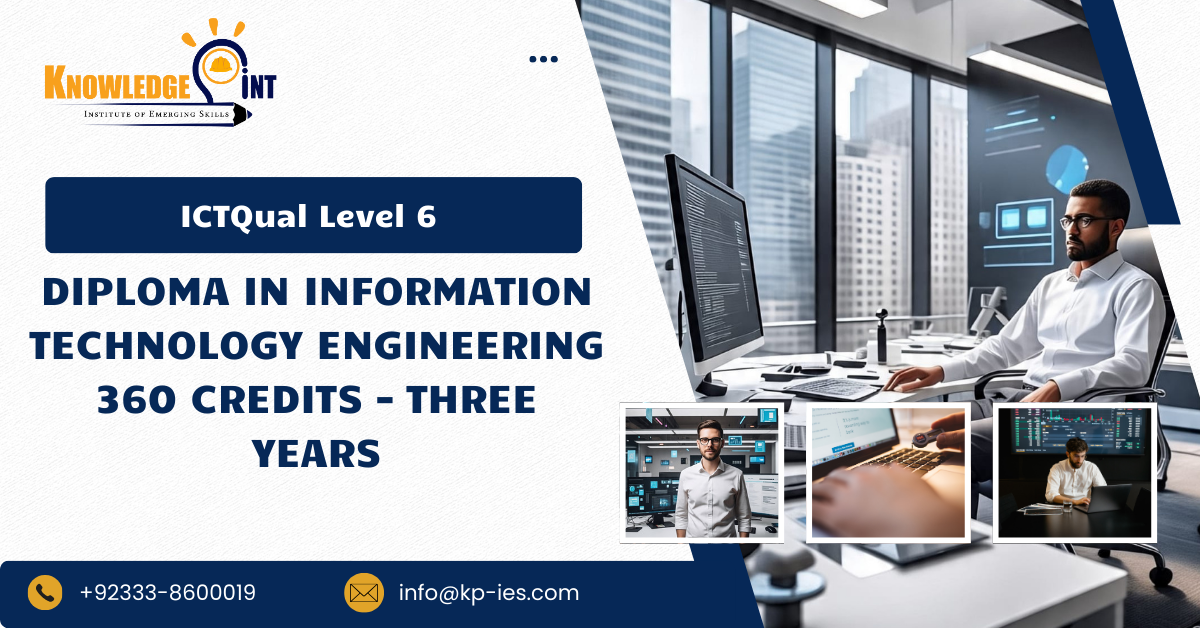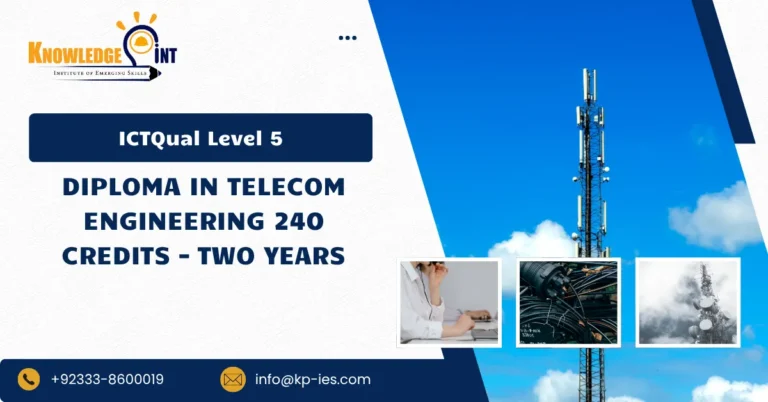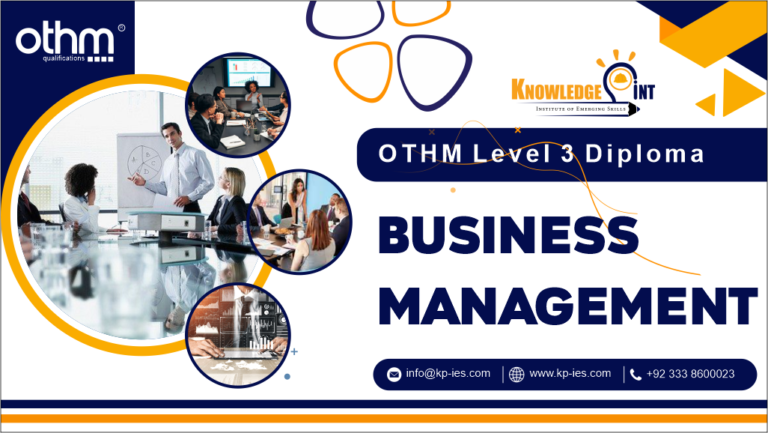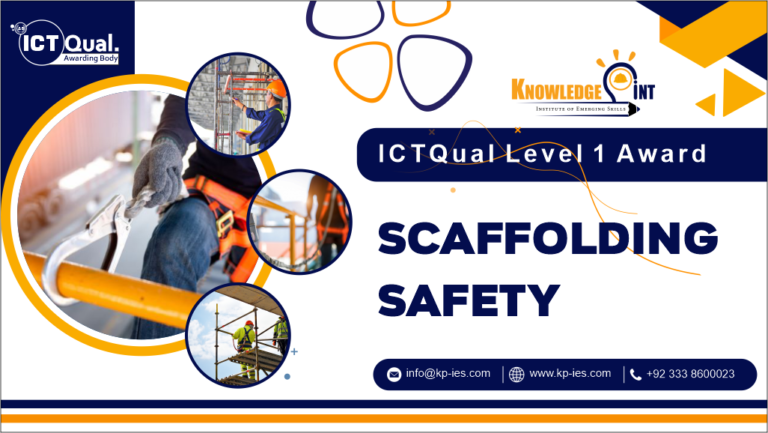In the fast-paced world of technology, staying ahead requires both deep theoretical knowledge and practical expertise. The ICTQual Level 6 Diploma in Information Technology Engineering is a comprehensive program designed to develop well-rounded IT professionals. Over the course of three years, learners gain 360 credits by mastering foundational concepts, advanced technical skills, and specialized knowledge, making this diploma an excellent choice for those aspiring to build successful careers in IT or pursue postgraduate studies.
The program is structured to provide a blend of foundational knowledge in the initial stages, advanced technical skills in the mid-stages, and specialized expertise towards the final year. It is ideal for individuals seeking a robust career in IT engineering or planning to advance to postgraduate studies.
The ICTQual Level 6 Diploma in Information Technology Engineering is a transformative program for individuals aiming to excel in the IT sector. By blending foundational knowledge, specialized expertise, and real-world application, the program prepares graduates to thrive in a competitive, technology-driven world.
Whether you aspire to innovate, lead, or specialize, this diploma is your gateway to achieving your career and academic goals in IT engineering.
For individuals seeking a robust career in IT engineering or aiming to advance their academic qualifications, such a program is not just a stepping stone it’s the launchpad for a successful and fulfilling professional journey.
Course Overview
The ICTQual Level 6 Diploma in Information Technology Engineering 360 Credits – Three Years consists of 36 mandatory units which are as follows.
Year 1: Foundation and Core Concepts
- Introduction to Information Technology
- Computer Architecture and Hardware
- Operating Systems Fundamentals
- Networking Fundamentals
- Programming Principles
- Database Design and Management
- Web Technologies and Development
- IT Support and Troubleshooting
- Mathematics for IT
- Introduction to Cybersecurity
- Systems Analysis and Design
- Project Management Fundamentals
Year 2: Specialized IT Engineering
- Advanced Networking and Protocols
- Cloud Computing and Virtualization
- Advanced Programming Techniques
- Advanced Database Systems
- Mobile Application Development
- System Security and Risk Management
- Enterprise IT Infrastructure
- Software Engineering and Development Lifecycle
- IT Management and Governance
- Business Intelligence and Data Analytics
- Human-Computer Interaction
- Ethical and Legal Issues in IT
Year 3: Professional Development and Advanced Implementation
- Advanced Networking Technologies
- Artificial Intelligence and Machine Learning
- Cybersecurity for IT Professionals
- Cloud Infrastructure and Services
- Project Management for IT Projects
- Advanced Software Development Practices
- System Integration and Implementation
- IT Research Methodologies
- Professional Practice and Ethics
- Internship/Industry Placement
- Capstone Project I: System Design and Development
- Capstone Project II: Evaluation and Implementation
The future progression of the ICTQual Level 6 Diploma in Information Technology Engineering 360 Credits – Three Years can lead learners towards several pathways, depending on their career goals and aspirations in the field of law and related sectors. Here are some potential avenues of progression:
Learning Outcomes for Each Study Unit
Year 1: Foundation and Core Concepts
- Introduction to Information Technology: Understand the role of IT in modern industries and foundational IT concepts.
- Computer Architecture and Hardware: Identify and explain the functions of key hardware components.
- Operating Systems Fundamentals: Describe the architecture and operations of operating systems.
- Networking Fundamentals: Apply basic networking concepts and configure simple networks.
- Programming Principles: Write, debug, and document basic code using programming languages.
- Database Design and Management: Develop and manage simple database systems using SQL.
- Web Technologies and Development: Create responsive web pages using basic HTML, CSS, and JavaScript.
- IT Support and Troubleshooting: Diagnose and resolve common IT support issues.
- Mathematics for IT: Apply mathematical principles to problem-solving in IT contexts.
- Introduction to Cybersecurity: Identify basic cybersecurity threats and implement foundational protections.
- Systems Analysis and Design: Analyze user requirements and design effective IT solutions.
- Project Management Fundamentals: Understand key project management methodologies and tools.
Year 2: Specialized IT Engineering
- Advanced Networking and Protocols: Configure and troubleshoot advanced network protocols.
- Cloud Computing and Virtualization: Design and deploy scalable cloud-based solutions.
- Advanced Programming Techniques: Develop robust, efficient, and maintainable software solutions.
- Advanced Database Systems: Implement advanced database features for complex data handling.
- Mobile Application Development: Design and develop cross-platform mobile applications.
- System Security and Risk Management: Evaluate and mitigate IT system vulnerabilities and risks.
- Enterprise IT Infrastructure: Architect and manage enterprise-level IT solutions.
- Software Engineering and Development Lifecycle: Apply lifecycle models to develop high-quality software.
- IT Management and Governance: Implement IT governance strategies to align with business goals.
- Business Intelligence and Data Analytics: Extract and interpret insights from data using BI tools.
- Human-Computer Interaction: Design user-centered interfaces and improve user experience.
- Ethical and Legal Issues in IT: Analyze ethical dilemmas and legal issues in IT practices.
Year 3: Professional Development and Advanced Implementation
- Advanced Networking Technologies: Design and deploy advanced networking architectures.
- Artificial Intelligence and Machine Learning: Implement AI models and machine learning algorithms.
- Cybersecurity for IT Professionals: Apply advanced cybersecurity principles in IT environments.
- Cloud Infrastructure and Services: Manage and optimize cloud infrastructure for scalability and efficiency.
- Project Management for IT Projects: Lead IT projects using advanced project management techniques.
- Advanced Software Development Practices: Develop sophisticated software using advanced development methodologies.
- System Integration and Implementation: Integrate diverse systems into cohesive IT solutions.
- IT Research Methodologies: Conduct independent research using appropriate methodologies.
- Professional Practice and Ethics: Demonstrate ethical decision-making and professionalism in IT practice.
- Internship/Industry Placement: Apply learned skills in a real-world IT environment.
- Capstone Project I: System Design and Development: Design a comprehensive IT system addressing real-world problems.
- Capstone Project II: Evaluation and Implementation: Evaluate and implement the designed system, ensuring functionality and usability.
Course Benefits of the ICTQual Level 6 Diploma in Information Technology Engineering 360 Credits – Three Years :
1. Specialized Expertise
- Auditing Proficiency: Gain specialized knowledge and skills in auditing energy management systems according to the ISO 50001:2018 standard.
- Industry Recognition: Earn a globally recognized qualification that demonstrates your proficiency as an energy management systems auditor.
2. Career Advancement
- Expanded Career Opportunities: Qualify for roles such as Lead Energy Auditor, Energy Management Consultant, or Compliance Officer.
- Higher Earning Potential: Enhance your value to employers and increase your earning potential with specialized expertise in energy management auditing.
3. Industry-Relevant Skills
- Practical Application: Acquire practical skills and techniques for planning, conducting, and documenting energy management system audits.
- Effective Communication: Develop communication skills to interact with auditees, audit teams, and stakeholders effectively.
4. Contribution to Sustainability
- Promotion of Energy Efficiency: Play a key role in promoting energy efficiency and reducing environmental impact within organizations.
- Support for Sustainable Practices: Assist organizations in implementing and maintaining energy management systems that support sustainability goals.
5. Quality Assurance
- Compliance Assurance: Help organizations achieve compliance with ISO 50001:2018 requirements and other relevant regulatory standards.
- Risk Mitigation: Identify areas of non-conformance and provide recommendations for corrective actions to mitigate risks.
6. Continuous Professional Development
- Lifelong Learning: Engage in continuous professional development by staying updated with the latest developments and trends in energy management auditing.
- Networking Opportunities: Connect with industry professionals, auditors, and experts, expanding your professional network and opportunities.
7. Organizational Benefits
- Improved Performance: Contribute to the improvement of organizational energy performance through effective auditing and recommendations for continuous improvement.
- Enhanced Reputation: Help organizations build a positive reputation for their commitment to energy management and sustainability practices.
8. Personal Growth
- Leadership Development: Develop leadership skills to effectively manage audit teams, delegate tasks, and ensure audit objectives are met.
- Confidence Boost: Gain confidence in your abilities as an energy management systems auditor through practical training and hands-on experience.
Graduates of the ICTQual Level 6 Diploma in Information Technology Engineering 360 Credits – Three Years are equipped with the skills and knowledge to pursue a range of academic, professional, and entrepreneurial pathways. Below are the key progression opportunities:
1. Academic Progression
Graduates can further enhance their expertise and qualifications through advanced studies, including:
- Postgraduate Degrees:
- Master’s programs in IT-related fields such as Computer Science, Software Engineering, Data Science, Cybersecurity, or Artificial Intelligence.
- Specialized MBAs focusing on IT Management or Technology Leadership.
- Professional Certifications:
- Certifications such as AWS Certified Solutions Architect, Cisco Certified Network Professional (CCNP), Microsoft Azure Solutions Architect, or CompTIA Security+.
- Industry-specific certifications in fields like AI, Big Data, or Project Management (e.g., PMP or PRINCE2).
2. Career Opportunities
This program prepares graduates for various mid to senior-level roles in IT and engineering fields, including:
- Software Development: Full Stack Developer, Mobile App Developer, or Software Engineer.
- Networking and Security: Network Architect, Cybersecurity Specialist, or System Administrator.
- Data and Cloud: Data Analyst, Business Intelligence Consultant, Cloud Solutions Architect.
- IT Project Management: IT Project Manager, Systems Analyst, or IT Governance Officer.
Key Sectors:
Graduates can work in industries such as healthcare IT, finance and banking, education technology, e-commerce, and government IT infrastructure.
3. Entrepreneurial Pathways
The program equips students with skills to innovate and launch their own tech ventures, such as:
- Starting a software development company focusing on custom solutions.
- Building a cybersecurity consultancy to assist businesses in risk management.
- Creating and monetizing mobile or web applications.
- Providing cloud services or managed IT solutions to enterprises.
4. Research and Development
Graduates passionate about innovation can pursue roles in R&D, contributing to advancements in areas such as:
- Artificial Intelligence and Machine Learning for automation and predictive analytics.
- Blockchain and Cryptography for secure transactions.
- IoT and Smart Technologies for interconnected systems in smart cities or industries.
5. Leadership and Management Roles
With experience and continued learning, graduates can progress into leadership roles like:
- Chief Technology Officer (CTO)
- IT Director or Head of IT Operations
- Strategic IT Consultant
- Technical Lead or Team Manager







